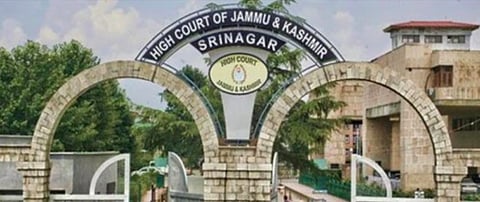

THE Jammu & Kashmir and Ladakh High Court has held that the freedom of speech and expression cannot be stretched to such a limit as to allow an individual to call Kashmir an occupant of the military which is like cancer, or the people there being slaves.
"In my opinion, the freedom of speech and expression guaranteed under the Constitution cannot be stretched to such a limit as to allow a person to question the status of a part of the Country or its people. It is one thing to criticize the Government for its negligence and express outrage on the violation of human rights of the people but it is quite another to advocate that the people of a particular part of the Country are slaves of the Government of India or that they are under occupation of armed forces of the Country", said Justice Sanjay Dhar. He, however, clarified that the expression of outrage at the negligence and inhuman attitude of the security forces, police and establishment would come within the ambit of freedom of expression of an individual, which includes the freedom to criticize the government of the day as it is permissible under law, but the same may not be the position if an individual questions the fact of a state being a part of the country by using the expressions 'occupation of military' or the people being 'slaves'.
Justice Dhar was ruling on a petition filed by advocate Muzamil Butt seeking quashing of the first information report against him under Section 13 of the Unlawful Activities (Prevention) Act. Section 13 provides for the punishment for 'unlawful activities', which are defined in Section 2(o) of the Act.
Butt was booked in 2018 for posting on Facebook certain comments regarding the killings of six civilians in a blast at a gunfight site at Laroo Village in Kulgam that had triggered outrage across Kashmir. In his Facebook post, Butt, among other things, said: "For the first time in my life, I felt broken and weak and I could acknowledge that were are slaves and slaves have no life of their own."; "The highest that I could sum up from his disaster is the quote of Dr. Manan Wani: 'Occupation is like a cancer which will consume everyone of us.'"; "It reflects the culmination of systemic failure. It reflects on those heartless structures that celebrate occupation of military bonhomie in cozy champagne".
Justice Dhar opined that the petitioner, who happens to be an advocate, can very well understand the import of these expressions.
"By making these comments, he is certainly advocating and supporting the claim that Jammu and Kashmir is not a part of India and that it is occupied by Indian military with the people having being (been) reduced to the status of slaves. Thus, he is questioning the sovereignty and territorial integrity of the country", Justice Dhar ruled. He added that the petitioner, by uploading these posts, crossed the Lakshman Rekha which demarcates the freedom of expression guaranteed under Article 19 of the Constitution of India from the reasonable restrictions imposed on such freedom on the ground of sovereignty and integrity of India.
"The intention of a person can be gathered from the words spoken or written or other expressions. Therefore, the expressions used by the petitioner, who happens to be a law knowing person, clearly show that he intended to advocate a particular ideology which supports the claim of secession of Jammu and Kashmir, which is an integral part of India. This act of the petitioner, therefore, prima facie, falls within the definition of 'unlawful activity' as contained in Section 2(o) of the [Unlawful Activities (Prevention)] Act punishable under Section 13 of the Act", said Justice Dhar.
Click here to read the order.